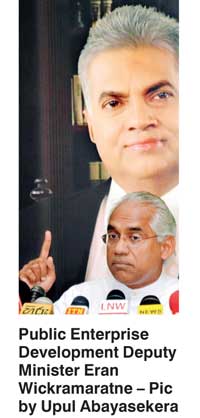Thursday Feb 19, 2026
Thursday Feb 19, 2026
Saturday, 17 December 2016 00:00 - - {{hitsCtrl.values.hits}}
By Chathuri Dissanayake
Outlining the elements of the proposed Public Enterprises Act to be presented in Parliament next year, Public Enterprise Development Deputy Minister Eran Wickramaratne yesterday said the Government was taking steps to manage State institutions better to reduce an estimated Rs.600 billion in losses.
The new Act will have provisions to set up a Public Enterprise Board responsible for all board appointments of all State-managed institutions. The bill also has provides provisions to monitor performance of the institutions and governance practices of the appointed boards, Wickramaratne said, speaking at media briefing held at UNP headquarters Sirikotha.
“The act will help reduce losses, and reduce political interference,” the Deputy Minister said.
In 2014, 250 Government entities accounted for a loss of Rs. 600 billion, Wickramaratne highlighted.
“This is equivalent to half of Government revenue. This is the money we should have spent on education. That is why we are taking steps to reduce the losses,” he said.
Provisions in the new Bill will ensure that “fit and proper” individuals are appointed minimising possibilities of Government cronies being appointed to the boards of State-run institutions.
“The candidates considered should have educational qualifications and experienceand be ethical in business practices, so we will be able to end the politicisation of these institutions. This will also ensure that entities are run better and more efficiently and earn better revenue,” he said.
Accordingly, nominations for board positions in different institutions can send by anyone including ministries, but the final say lies with the Public Enterprise Board, the Minister said. However he failed to outline how the Public Enterprise Board would be appointed.
The Public Enterprise Board will also monitor performance of the institutions and appointed boards of the said institutions through Key Performance Indicators (KPIs) set to measure social and commercial returns earned by the institutions and good governance practices.
However the Government is yet to decide on course of action to be taken regarding currently functioning director boards.“We have not decided yet, we will take a suitable course of action to do justice by the board members and by the country,” he said.
Explaining the need for Private-Public Partnerships to mitigate losses and be more productive, Wickramaratne said telecom was one such success story.
In an attempt to silence critics on Hambantota Port, the Deputy Minister claimed the 99-year-old lease arrangement would help transform a white elephant to a profit making venture.
Wickramaratne also justified land acquisitions in Hambantota for the Chinese investment focused industrial zone, explaining that such zones are needed to develop the region.
“Industrial development should reach other areas. The Western Province developed because there were industrial zones and functioning infrastructure. The same has to happen in other provinces,” he explained.
He also lashed out against the discourse that employment opportunities in Hambantota Port should only be given to residents in the area, highlighting that the entities were national assets managed by taxpayer money.
“Anyone with right qualification should be able to do a job, not just people from Hambantota. That village mentality has to go,” he charged.